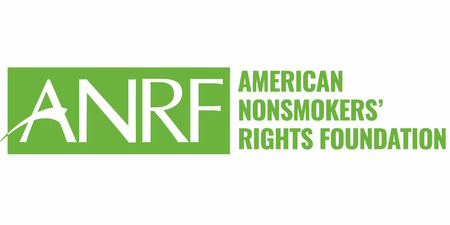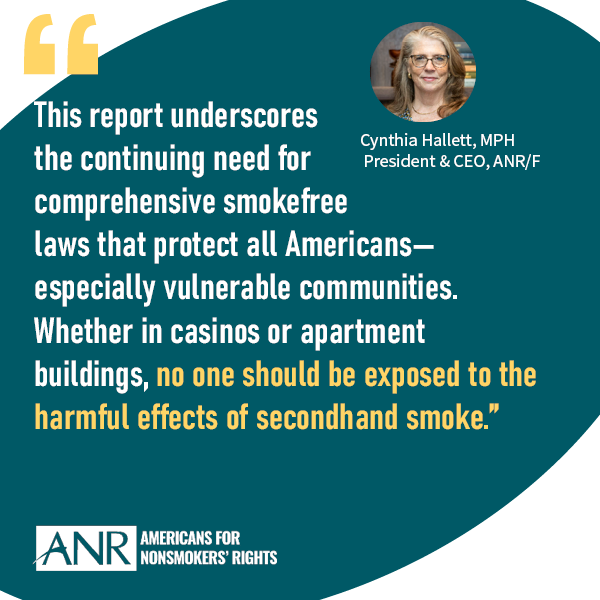ANR Applauds the Surgeon General for His Leadership on the Issue, While Emphasizing the Need for Stronger Smokefree Policies

**Updated Information 2/20/25**
Though the report was recently removed from the CDC website, ANR has several resources available for you, including our document: “Highlights from the 2024 Surgeon General’s Report: Key findings and recommendations on the importance of smokefree indoor air to reduce health disparities.” Access these materials here.
Berkeley, CA — The U.S. Surgeon General released a comprehensive report this morning that highlights continued progress in reducing smoking rates and secondhand smoke exposure while exploring the ongoing challenges that remain, especially for marginalized communities disproportionately impacted by smoking-related harms. There are still significant gaps where smokefree policies are lacking—such as in casinos, multi-unit housing, and areas affected by the growing use of cannabis.
“We applaud the Surgeon General for his continued leadership in addressing the dangers of smoking and secondhand smoke. This report underscores the continuing need for comprehensive smokefree laws that protect all Americans—especially vulnerable communities,” said Cynthia Hallett, President and CEO, Americans for Nonsmokers’ Rights. “Whether in casinos or apartment buildings, no one should be exposed to the harmful effects of secondhand smoke. We must continue to push for policies that ensure clean air and equal protection for all.”
Key highlights from the report include:
- Significant decline in smoking rates: Cigarette smoking among all U.S. adults has declined by more than 70% since 1965.
- Disproportionate impact on marginalized groups: Low-income and marginalized communities remain disproportionately affected by tobacco-related harms. Exposure to secondhand tobacco smoke remains higher among Black people than among people in other racial and ethnic groups, and among people from lower socioeconomic backgrounds.
- The need for comprehensive smokefree policies in casinos: Research shows that casino workers and patrons are exposed to high levels of secondhand tobacco smoke, putting their health at serious risk. Studies have documented dangerous levels of secondhand smoke in casinos, and casino workers suffer disproportionate health risks due to this exposure.
- Disparities in multi-unit housing: The risk of secondhand smoke infiltration remains in shared living spaces, where tobacco smoke can travel between units, exposing non-smokers, including children, to harmful levels of secondhand smoke. This problem is particularly prevalent in subsidized housing, which serves millions of low-income families. Smokefree policies for multi-unit housing would reduce gaps in smokefree protections and reduce exposure to secondhand tobacco smoke.
- Rise of cannabis smoke: The rise in cannabis use and its legalization in many states has introduced new challenges for smokefree policies. Cannabis smoke contains harmful toxins and fine particulate matter similar to tobacco smoke. Dual use of tobacco and cannabis is also increasing, particularly among Black and Hispanic populations.
- Support for local smokefree ordinances: Municipalities should continue to have the ability to pass smokefree laws without state or federal preemption. State and federal preemption of local ordinances threatens progress by stripping cities and counties of their ability to respond to emerging public health threats specifically in smoking and secondhand smoke exposure. Allowing for municipalities to enact comprehensive smokefree policies is crucial for safeguarding public health.
More on the significance of this report:
ANR Foundation is heavily cited (37 times) throughout the report (see pages 548-560), and pages 551-552 feature several of our maps, created to show the progression of laws over time. The report elevates and validates our work, highlighting how smokefree policies have reduced tobacco-related disparities and emphasizing the need for comprehensive protections that cover all forms of emissions including e-cigarettes and cannabis in addition to tobacco. It also underscores the importance of smokefree casinos as major workplaces and Tribal policy progress. Lastly, it reflects on the success of smokefree airplanes—a powerful reminder of how worker-led movements like flight attendants and now casino workers with CEASE are carrying the torch forward toward a smokefree future.
Read the full report
Consumer guide: This guide provides an easy-to-read overview of the Surgeon General’s report and its findings. It also provides an overview of smoking cessation resources. Download Consumer Guide
###
ABOUT AMERICANS FOR NONSMOKERS’ RIGHTS Americans for Nonsmokers’ Rights (ANR), sister organization to ANR Foundation, is a member-supported, non-profit advocacy group that has been working for over 45 years, since 1976, to protect everyone’s right to breathe nontoxic air in workplaces and public places, from offices and airplanes to restaurants, bars, and casinos. ANR has continuously shined a light on the tobacco industry’s interference with sound and life-saving public health measures and successfully protected 61% of the population with local or statewide smokefree workplace, restaurant, and bar laws. ANR aims to close gaps in smokefree protections for workers in all workplaces, including bars, music venues, casinos, and hotels. For more information, please visit https://nonsmokersrights.org and https://smokefreecasinos.org.






